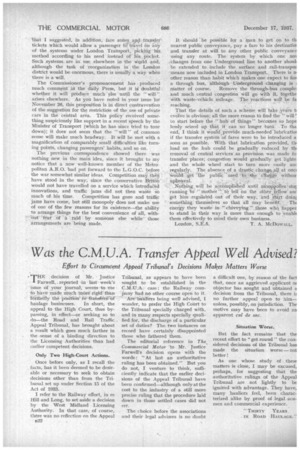Was the C.M.U.A. Transfer Appeal Well Advised?
Page 22

If you've noticed an error in this article please click here to report it so we can fix it.
Effort to Circumvent Appeal Tribunal's Decisions Makes Matters Worse
• THE decision of Mr. Justice Farwell,. reported -in last' week's issue of yOur journal, seems to me to have made Much .inbre rigid' than 'fOrlitekly the Posifre;n''aiifrb
haulage businesses. In short, the appeal to the High Court, thus bypassing, in effect—or seeking so to do—the Road and Rail Traffic Appeal Tribunal, has brought about a result which goes much farther in the sense of a binding direction to the Licensing Authorities than had earlier competent decisions.
Only Two High-Court Actions.
Once before only, as I recall the facts, has it been deemed to be desirable or necessary to seek to obtain decisions other than from the Tribunal set up under Section 15 of the Act of 1933.
I refer to the Railway effort, in re Hill and Long, to set aside a decision by the West Midland Licensing Authority. In that case; of course, there was no reflection on the Appeal
ti22 Tribunal, as appears to have been sought to be established in the C.M.U.Ac case: the Railway company had no other course open to it. " Are' halers being well advised, I wonder, to prefer the High Court to the Tribunal specially charged with, and in many respects specially qualified for, the discharge of a particular set of duties? The. two instances on record have certainly disappointed those who fathered them.
The editorial reference in The Commercial Motor -to Mr. Justice Farwell's decision opens with the words : "At last an authoritative ruling has been obtained." But you do not, I venture to think, sufficiently indicate that the earlier decisions of the Appeal Tribunal have been confirmed—although only at the cost to the industry of a still more precise ruling that the procedure laid down in those settled cases did not err.
The choice before the associations and their legal advisers is no doubt a difficult one, by reason of the fact that, once an aggrieved applicant oi objector has sought and obtained a decision from the Tribunal, there is no further appeal open to him— unless, possibly, on jurisdiction. The motive may have been to avoid an apparent cal de sae.
Situation Worse.
But the fact remains that the recent effort to "get round" the considered decisions of the Tribunal has made the situation worse—not better As one whose study of these matters is close, I may be excused, perhaps, for suggesting that the authoritative rulings of the Appeal Tribunal are not lightly to be ignored with advantage. They have, many hauliers feel, been characterized alike by proof of legal acumen and commercial experience.
THIRTY YEARS -IN ROAD HAVLAGE




























